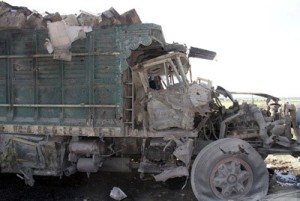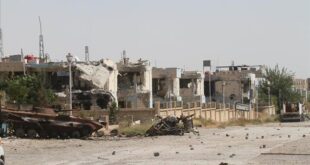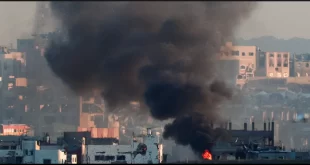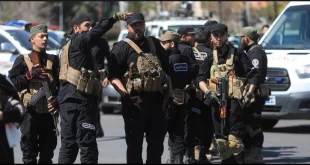
Apr 20, 2014, Christof Lehmann (nsnbc) : Western-backed “Holy Warriors” in Syria attacked an aid convoy of the Syrian Arab Red Crescent in Salmiyeh city on Saturday, killing five civilian aid workers and injuring nine. Attacks against humanitarian aid convoys constitute one of the most serious war crimes.
The attack, as well as core NATO and GCC members’ use of aid convoys and ambulances for smuggling weapons and troops implicate core NATO and GCC member, arguably the NATO alliance itself in war crimes.
The Syrian news agency SANA quotes local sources in Salmiyeh as saying that the blast from a car bomb killed five civilians, including one of the Red Crescent (Miras) drivers, while nine were injured.
The so-called “rebels” blew up an explosive-laden vehicle as four Miras trucks were passing the bakery in the city of Salmiyeh in Hama.

The aid convoy transported food as well as medicine for people affected by the now more then three year long war against the country.
The terrorist attack is part of a recent series of similar attacks that have killed dozens and injured hundreds in cities such as Homs, Hama and Aleppo, reports the news agency, adding that the chain of attacks began after the defeat of the insurgents in the city of Qalamoun.
Core NATO States, GCC member States and NATO accountable for War Crimes.
Despite attempts by the USA, UK, France, Turkey, Saudi Arabia and Qatar to designate the conflict in Syria as civil war, their state sponsorship and de-facto use of mercenaries gives the conflict the status of an international war under international law and these countries are thus responsible for their actions as parties to the war.

Arguably, it is not only the individual NATO members, but the alliance itself, that could be held accountable for war crimes committed by mercenaries who are fighting on their behalf.
The war is also to be designated an international conflict on the basis of the Geneva Conventions.
The “Protocol Additional to the Geneva Conventions of 12 August 1949, and relating to the Protection of Victims of International Armed Conflicts (Protocol I), 8 June 1977″ . The International Committee of the Red Cross states that:
Article 1 (4) provides that armed conflicts in which peoples are fighting against colonial domination, alien occupation or racist regimes are to be considered international conflicts.
The bombing of the Red Crescent convoy in Salmiyeh also falls under the provisions of the First and Second Geneva Conventions and the additional protocol because:

The International Committee of the Red Cross (ICRC) states that:
Part II (Articles 8-34) develops the rules of the First and Second Geneva Conventions on wounded, sick and shipwrecked. It extends the protection of the Conventions to civilian medical personnel, equipment and supplies and to civilian units and transports and contains detailed provisions on medical transportation.
Part III and several chapters of Part IV (Articles 35-60) deal with the conduct of hostilities, i.e. questions which hitherto were regulated by the Hague Conventions of 1899 and 1907 and by customary international law. Their reaffirmation and development is important in view of the age of the Hague Conventions and of the new States which had no part in their elaboration. Article 43 and 44 give a new definition of armed forces and combatants. Among the most important Articles are those on the protection of the civilian population against the effects of hostilities. They contain a definition of military objectives and prohibitions of attack on civilian persons and objects. Further Articles (61-79) deal with the protection of civil defence organizations, relief actions and the treatment of persons in the power of a party to a conflict.
While the core NATO and GCC member States backed mercenaries implicate their state-sponsors in the violation of these international laws, they also implicate them further into war crimes by:
- The Turkish Intelligence Service MIT’s involvement in the use of trucks, belonging to the Turkish charity IHH, for transporting weapons and munitions for mercenaries from Turkey to Syria.
- By using ambulances for the smuggling of weapons and mercenaries across the Turkish – Syrian border.
 Syria Support Movement solidarity with the Syrian people
Syria Support Movement solidarity with the Syrian people





